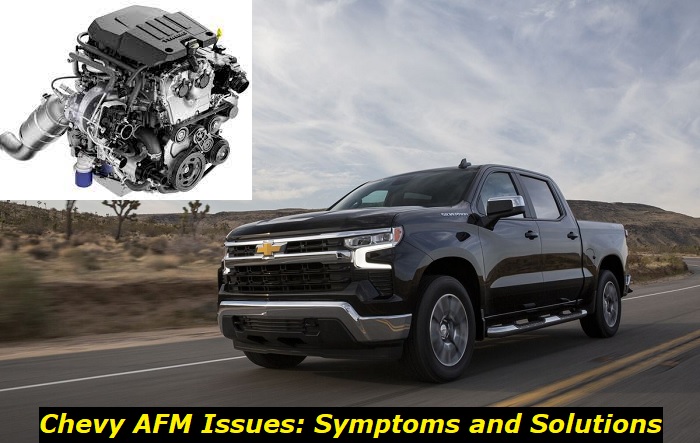If you are a proud owner of a Chevy vehicle with an 8-cylinder engine, you may have already heard the term AFM. This stands for Active Fuel Management and basically means the same as Active Cylinder Management in some other cars. So, this is the system that turns on and off some cylinders in a big engine letting it run with much lower fuel consumption.
Cylinder deactivation system problems highlights
- Level of importance:Medium
- Commonreasons:Internal problems in the system, leaks, electrical issues
- DIY inspection:Impossible
- DIY repair:Impossible
- Price for repair:$250 - $800
- Can you drive?Yes, butthe power may be limited
- Ways to fix:Only professional repair is possible

Chevy AFM system in 8-cylinder engines - what's this?
Chevrolet has been using its cylinder management system called AFM in almost all recent versions of V6 and V8 engines. In most V8 powerplants, the system will turn off 4 cylinders and convert your big and mighty engine into a V4. It means, you will lose about half of the power and the engine may start working a little harshly, but it will consume about 30% less fuel.
The AFM system is aimed at fuel economy and it also has another important task - to reduce the amount of exhaust gases that are emitted into the atmosphere when you are driving your Chevy. These tasks are super important and they help Chevrolet to fit their big engines into certain emission standards.
Here's how the system works:
- once your engine starts working at a constant speed and with constant RPM, the load on the cylinders gets lower;
- special sensors measure this load and when it comes to a certain point, they command the ECU to stop supplying certain cylinders with fuel;
- the ECU then cuts the fuel injection into 4 cylinders making your V8 basically a V4, so two cylinders on each side are working;
- your engine keeps working in this way till you press the gas pedal harder to accelerate or till the load on the engine becomes higher than before;
- once this happens, the sensors command the ECU to supply all cylinders with fuel and the engine becomes V8 again;
- usually, the AFM is very helpful when you are driving on a highway at a constant speed when the engine is under low loads;
- when driving in the city or when towing something, the AFM will not kick in because you will need all the power from the engine.
Actually, in new engines, AFM is a great thing. It helps you save a lot of fuel and you can see this just by investigating gas mileage in V8 vehicles. EPA estimated gas mileage for highways is usually much more positive for those vehicles that are equipped with the AFM system.
We've tried to describe the way the system works as simply as possible and you might have thought there is nothing to be broken and cause problems. But, unfortunately, a lot of units in the AFM system in Chevy engines may go wrong and make you pay quite a lot of money to solve the issues.
What are the problems with AFM in your Chevy V8?
The most common issue with AFM is lifter failure. Lifters are the ones that close or open valves and let cylinders work. But they are not eternal. AFM lifters tend to fail in pretty much all AFM-equipped engines and repairing these parts is not cheap at all because, for this, you will need to take apart the heads of the engine.
Lifter failure is more likely to happen in vehicles that activate AFM more often. For example, if you are using your truck exclusively in the city and/or constantly towing something heavy, the lifters will be OK because they aren't bothered much by the AFM. But if you are driving on highways, your AFM will be actively working all the time and this will cause premature failure of the lifters.
Also, there are other problems connected with the AFM system:
- your V8 may consume much more oil than you think and suddenly, your engine may get low oil levels;
- the catalytic converter may go bad because of oil burning in it and also unburnt fuel explosion directly in the converter;
- the fuel consumption may go up and the mileage will fall rapidly if the system is glitching;
- you may suddenly understand that you are driving a V4 engine with just a little power in it even when you need your V8;
- the system may trigger a check engine light and several different codes and messages on the dash;
- overall, the engine may become sluggish and too weak.
In the end, a malfunctioning AFM system may lead to excessive oil consumption, huge fuel consumption, engine vibrations, engine head damage, valves damage, catalytic converter damage, etc. So, you should take this situation seriously and solve the problem with the cylinder management system once it shows up.
Also, check the oil level in any AFM engine regularly. Sometimes, the oil will go down in the oil pan really fast and the oil pressure sensor will only go on the dash when it's too late and the engine is already poorly lubricated.
What are the symptoms of a sudden AFM failure in your Chevy V8?
Pay attention to these symptoms to understand that there is something wrong with the cylinder management in your Chevy engine:
- low power of the engine;
- vibrations and harsh work;
- unstable idle RPM;
- changed exhaust sound;
- different errors and messages on the dash;
- sudden oil consumption;
- black smoke from the tail pipe;
- jerky acceleration.
These symptoms may not appear altogether. There may be just several of them or even just one of them in the beginning. But after the problem deteriorates, the new symptoms will add and, in the end, you will have a jerky and vibrating engine that drinks up oil and doesn't want to go anywhere.
What can you do with a bad AFM system in a Chevy V8 engine?
Repairing this problem is not cheap and fast. In most cases, people will think about deactivating the AFM system. But this will only help if your engine still doesn't have any problems. By deactivating the AFM, you will save the engine from lifter failure in the future. But if something has already failed, you will need a proper repair, not just AFM deactivation.
The repair will depend on what's broken. A faulty lifter will need replacement or cleaning. The poor catalytic converter will also need to be replaced. The smoky engine will need to be inspected and then repaired.
So, the repair depends on the type of failure your engine has. And the first step for a healthy V8 Chevy engine is the proper inspection. Without this, you can't even tell which part causes problems. Unfortunately, any repair after your AFM system fails will be pretty expensive and will take some time.
The best thing you can do to minimize your expenses is to address the issue once it shows up. Never drive your engine for another 100-200 miles if you understand it has the AFM problem. Immediately drive your vehicle to the dealer or to a trusted repair shop.
Should you worry if your V8 engine is showing AFM symptoms?
Yes, definitely. If you don't do anything and just keep driving hoping that the engine will get healthy somehow without your help, this will lead to even worse damage, eventually. Chevy V8 engines are very durable if maintained and repaired on time. But if not, they may fail without even getting up to the 100,000-mile mark.
Here's the proper algorithm for you in case you suspect AFM problems in your Chevy:
- avoid sharp acceleration and try driving your engine as carefully as you can;
- contact the repair shop you can trust and arrange the visit to it as soon as possible;
- avoid driving your vehicle until you have it inspected - just drive it to the repair shop;
- have the engine properly inspected because these symptoms are too general to make any conclusions;
- have the engine repaired by a professional mechanic and only then drive the vehicle.
You can also prevent the problems by deactivating the AFM system before it actually fails. This is a recommended step for Chevy V8 engines but it also has a couple of downsides. The vehicle will emit more harmful gases into the atmosphere and will burn more fuel when driving on highways.
Don't drive your V8 Chevy if it shows some symptoms of AFM issues. Have it inspected and repaired as soon as possible to avoid extra costs.
About the authors
The CarAraC research team is composed of seasoned auto mechanics and automotive industry professionals, including individuals with advanced degrees and certifications in their field. Our team members boast prestigious credentials, reflecting their extensive knowledge and skills. These qualifications include: IMI: Institute of the Motor Industry, ASE-Certified Master Automobile Technicians; Coventry University, Graduate of MA in Automotive Journalism; Politecnico di Torino, Italy, MS Automotive Engineering; Ss. Cyril and Methodius University in Skopje, Mechanical University in Skopje; TOC Automotive College; DHA Suffa University, Department of Mechanical Engineering






Add comment